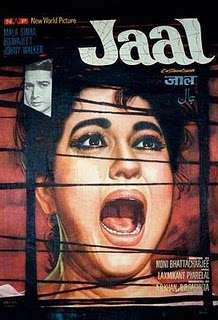Jaal (1967 film)
Jaal is a 1967 Hindi suspense-thriller film directed by Moni Bhattacharjee.[1] The film features Biswajeet and Mala Sinha in lead roles.
| Jaal | |
|---|---|
 Poster | |
| Directed by | Moni Bhattacharjee |
| Produced by | A.R. Khan |
| Written by | Moni Bhattacharjee (Script) Dhruva Bhattacharya (Script) Ehsan Rizvi (Dialogue) |
| Starring | Biswajeet Mala Sinha |
| Music by | Laxmikant Pyarelal |
| Cinematography | Apurba Bhattacharjee |
| Edited by | Das Dhaimade |
| Distributed by | Kapurchand & Co. (Theatrical) |
Release date |
|
Running time | 156 minutes |
| Country | India |
| Language | Hindi |
Plot
Inspector Shankar (Biswajeet) is assigned to investigate the mysterious death of Sunder Singh (Sujit Kumar), whose ship wrecks on a stormy night. Sunder was off to marry Sheila (Mala Sinha), the daughter of his mother's (Nirupa Roy) childhood friend who had long since died. Sheila was raised by her father, who dies of a heart attack when he comes to know of Sunder's death. Sunder's mother decides to take Sheila to live with her. In denial of her son's death, Sunder's mother keeps doing various acts in madness. She keeps serving food for Sunder, talks with his photos, and keeps feeling that her son has returned. Meanwhile, Shankar and Sheila fall in love. But in her madness, Sunder's mother starts preparations of Sunder's wedding with Sheila. Sunder's face-burnt body is found and the mystery continues whether his death was an accident or a murder.
Cast
- Biswajeet as Inspector Shankar
- Mala Sinha as Sheela
- Sujit Kumar as Sunder Singh
- Nirupa Roy as Sunder's Mother
- Tarun Bose as Micheal
- Helen
- Johnny Walker as Prakash
- Asit Sen as Uncle
- Jagdish Raj as Police
- Niranjan Sharma as Sheela's father
Music
The music of the film is composed by Laxmikant Pyarelal.
| Track | Songs | Singer | Lyricist |
|---|---|---|---|
| 1. | "Meri Zindagi Ke Chirag Ko" | Lata Mangeshkar | Raja Mehdi Ali Khan |
| 2. | "Dhadka Hai Dil Mein Pyar" | Lata Mangeshkar | Raja Mehdi Ali Khan |
| 3. | "Rokna Hai Agar" | Lata Mangeshkar | Raja Mehdi Ali Khan |
| 4. | "Akela Hoon Main" | Mohammad Rafi | Raja Mehdi Ali Khan |
| 5. | "Mizaaj-e-Garmi" | Mohammad Rafi, Lata Mangeshkar | Anand Bakshi |
| 6. | "Dil De De" | Mohammad Rafi, Asha Bhosle | Anand Bakshi |
References
- Peter Cowie, Derek Elley (1977). World Filmography: 1967. Fairleigh Dickinson Univ Press. p. 265. ISBN 0-498-01565-3.
External links
- Jaal (1967) on IMDb